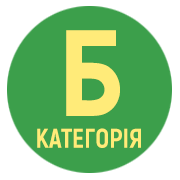FEATURES OF THE USE OF INFORMATION AND COMMUNICATION TECHNOLOGIES IN THE PROCESS OF TEACHING CHEMICAL DISCIPLINES FOR FUTURE TEACHERS OF NATURAL SCIENCE
Abstract
The article highlights the peculiarities of the use of information and communication technologies in the process of teaching chemical disciplines for future teachers of natural sciences. The article present the advantages of using Google applications in lectures and practical classes in chemical disciplines, which allow to hold free online video conferences; monitor the level of achievements of higher education students; to plan the educational process of teaching academic disciplines; place educational and methodical materials of disciplines in cloud services; to implement constant communication between the participants of the educational process. Also there`re provided examples of virtual chemistry laboratories with free access, which allow students to develop practical skills in the conditions of mixed or distance learning or the impossibility of performing a laboratory experiment in classroom conditions. The possibilities of the You Tube video storage for virtual study and analysis of laboratory experiments in chemistry were demonstrated. The article consider the advantages of introducing information and communication technologies into the educational process of institutions of higher education, which should meet the following goals: to develop the information and technology competences of future teachers; to increase motivation for implementation of information and communication technologies into the educational process as a modern means of learning; to specify the learning process; to form the ability to independently obtain information and control the learning process; to provide theoretical and practical training of future specialists in the academic discipline. The article present the opinion of students of higher education regarding the introduction of information and communication technologies into the educational process of teaching chemical disciplines, which noting the following positive points: study at a convenient time; constant communication with teachers; quick access to educational and methodical materials posted on the network; a better visual level of presentation of educational information.
References
URL: https://mon.gov.ua/ua/npa/pro-zatverdzhennya-koncepciyi-rozvitku-pedagogichnoyi-osviti (дата звернення: 29.06.2023).
2. Гладченко О., Ратушняк Т., Беспарточна О. Сучасні інформаційно-комунікаційні технології для забезпечення якісного дистанційного навчання. Теорія і практика управління соціальними системами: філософія, психологія, педагогіка, соціологія. 2022. № 2. С. 76-91.
3. Войтович І.С., Войтович О.П., Мартинюк Г.В. Використання віртуальних лабораторій в процесі навчання хімічних дисциплін. Наукові записки Тернопільського національного педагогічного університету ім. В. Гнатюка. Серія: Педагогіка. 2021. № 1. С. 32-40.
4. Биков В., Шишкіна М. Хмарні технології як імператив модернізації освітньо-наукового середовища вищого навчального закладу. Теорія і практика управління соціальними системами. 2016. № 4. С. 55-70.
5. Швачич Г.Г., Толстой В.В., Петречук Л.М., Іващенко Ю.С., Гуляєва О.А., Соболенко О.В. Сучасні інформаційно-комунікаційні технології: Навчальний посібник. Дніпро: НМетАУ, 2017. 230 с.
6. Тютюнник A. Використання хмарних технологій та Soft skills в освітній діяльності студентів та викладачів. Електронне наукове фахове видання «Відкрите освітнє е-середовище сучасного університету». 2015. № 1. С. 134-143.






